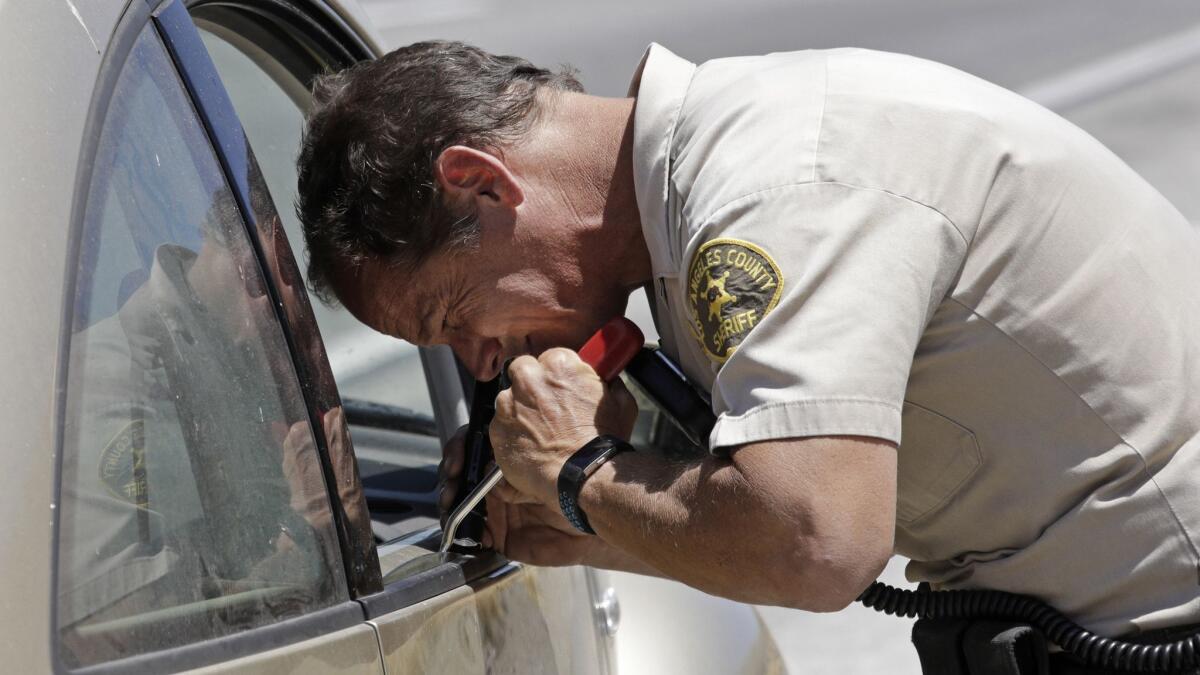L.A. County Sheriff’s Department suspends operations by unit that stopped thousands of innocent Latinos on 5 Freeway

The Los Angeles County Sheriff’s Department has suspended operations by a team of deputies that stopped thousands of innocent Latino motorists on a stretch of the 5 Freeway in search of drugs and other contraband, an agency spokeswoman said Friday.
The move comes amid accusations of racial profiling after a Times investigation in October found that 69% of drivers stopped by the team were Latino and that two-thirds of them had their vehicles searched — a rate far higher than motorists of other racial and ethnic groups. Cars belonging to all other drivers were searched less than half the time, according to the newspaper’s analysis of Sheriff’s Department data.
Responding to an inquiry from The Times, department spokeswoman Nicole Nishida said Friday that sheriff’s officials were gathering data on the Domestic Highway Enforcement team’s activities and would evaluate whether to resume operations some time in the future. The decision to shut down the unit was made Nov. 16, before newly elected Sheriff Alex Villanueva was sworn in this week, she said.
“The team is suspended until further notice,” Nishida said, adding that the deputies themselves remain working other assignments.
In an interview, Villanueva said he had been unaware the deputies had been pulled off the freeway but supported the move.
“I wouldn’t want the effort to continue until we know that it is constitutionally sound,” he said.
The team was put on hold a day after the county’s inspector general told members of the department’s civilian oversight panel that the team violated the constitutional rights of drivers and was inadequately supervised. The inspector general, Max Huntsman, questioned the reason for the unit’s existence and said sheriff’s officials failed to take heed of several federal court rulings that found the deputies on the team violated the rights of motorists by detaining them longer than was reasonable.
“The system is inherently built to violate the constitutional rights of a vast number of people passing through the I-5 Freeway,” Huntsman told the Sheriff Civilian Oversight Commission. “That’s a problem.”
Patti Giggans, chairwoman of the oversight body, said she thought the decision to suspend the highway team’s operations was wise, in light of the findings by Huntsman and The Times. She questioned, however, why department officials had not announced it publicly.
“I’m impressed they moved ahead like this, assuming they did it from a sincere place,” she said. “Whenever the sheriff is taking heed of what people around him are saying, it’s a good sign.”
Robert Bonner, a retired U.S. district judge and member of oversight panel, agreed.
“In light of the available information, it seems to be a good move to shut it down and evaluate whether the program was operating consistent with the Constitution and policies of the Sheriff’s Department,” he wrote in an email.
The California League of United Latin American Citizens released a statement praising the decision to halt the team’s operations and saying the organization looked forward to meeting with the new sheriff to “discuss how we can better serve our communities.”
“We cannot allow the construction of any system that is inherently built to violate the constitutional rights of people to exist,” the statement said. “L.A. County residents need to know that they are not being targeted.”
Huntsman, who began examining the team in response to the Times’ investigation, told the oversight panel his staff had conducted ride-alongs with the team’s deputies and saw no signs they were using race when deciding whom to stop or search. He added he was still gathering data on the team’s traffic stops that he plans to analyze for evidence of racial disparities.
After The Times shared the findings of its analysis with the agency earlier this year, sheriff’s officials declined to address the racial disparities but denied that deputies use race as a factor when making stops. Instead, they said, deputies pull over people for traffic violations or other infractions and then look for suspicious behavior or other signs from drivers and passengers that contraband may be hidden in the vehicle.
Sheriff’s officials repeated those claims to the civilian oversight commission and suggested the reason for the racial imbalance in stops was because Latinos drive that particular section of the freeway more often than drivers of other races or ethnicities.
But data from the California Highway Patrol, which mainly polices traffic violations on the same section of freeway, appears to undermine that claim. Earlier this week, the CHP provided Huntsman and The Times data showing that Latinos made up only 43% of drivers stopped by its officers from April through September on the same stretch of freeway that the sheriff’s team patrols.
Sheriff’s officials said they launched the highway team in 2012 as a response to a spate of drug overdoses in the Santa Clarita area, although Huntsman said in November that the team has not been effective in reducing overdoses. Similar units operate around the country as part of a federal program designed to use local and federal law enforcement agencies to combat drug trafficking.
Though the deputies are looking for any criminal, nearly all of their arrests have been for drug-related crimes. The 5 Freeway, they say, is a pipeline for cartels to move drugs up the West Coast and return to Mexico with cash from drug sales as well as weapons purchased in the United States.
The team has made more than 1,000 arrests and seized 600 pounds of cocaine and more than a ton of methamphetamine, among other drugs, since it was formed. But Huntsman said that, without knowing the total supply that is moving through the 5 Freeway corridor, it’s difficult to say how effective their efforts have been.
The Times’ analysis shows that deputies found drugs or other illegal items in the vehicles of Latino motorists at a rate that was not significantly higher than that of black or white drivers.
Times staff writer Maya Lau contributed to this report.
More to Read
Sign up for Essential California
The most important California stories and recommendations in your inbox every morning.
You may occasionally receive promotional content from the Los Angeles Times.












